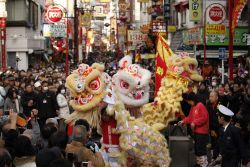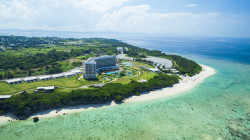
January 13, 2011
The Great Tokyo Michelin Sham
Awarding a coveted star to an oden restaurant cheapens the entire concept of fine dining
By Metropolis
Originally published on metropolis.co.jp on January 2011

Illustration by Phil Couzens
Young French chefs who aspire to earn a Michelin star must undergo a training regimen that’s as wide-ranging as it is intense. For starters, they are expected to master grandes sauces such as béchamel, hollandaise, espagnole and veloute, plus dozens of variations of these classic recipes. They must be schooled in charcuterie, the division of cooking that deals with prepared meats—paté, terrine, ham, bacon, sausage, galantine and more. And, of course, they need to develop a repertoire of inventive dishes featuring ingredients as diverse as shellfish, game, fruits and cheese, all the while overseeing a restaurant whose wine cellar, ambience and service capture the attention of the world’s fussiest diners.
On the other hand, Japanese chefs who want to earn a Michelin star just need to know how to slap a piece of raw fish on some rice.
That idea, simplistic though it may be, was first expressed to me by the manager of a major hotel restaurant following the publication of the inaugural Michelin Tokyo guidebook in 2008. I’m reminded of his gripe with each new appearance of the guide, when the editors inform us, with a characteristically French air of adulation and smug self-assurance, that Tokyo is the finest city in the world in which to dine. Although this idea was originally dismissed as a cynical marketing ploy by most right-thinking people—including, it was rumored, some local chefs who refused their proffered stars—the publisher has pressed on undaunted. The current guide doles out a whopping 266 stars to Tokyo restaurants, more than Paris and London combined. Included among them are 30 sushi counters, seven soba spots, five yakitori grills, a couple of Japanese-style pubs and an oden restaurant.
Let’s take a moment to digest that: yes, an oden restaurant now boasts a Michelin star.
To get a sense of how outrageous it is to equate these kinds of places with grand Paris restaurants like Taillevent and La Tour d’Argent, here’s a thought experiment: imagine if a classically trained French chef took a couple of months to learn how to grill chicken or make buckwheat noodles. (Or rather, imagine if such a chef trained in the Japanese way of doing these things; any French culinary professional worth her salt already knows how to skewer poultry or work with flour.) Is there any doubt that this chef would then be able to prepare yakitori or soba every bit as satisfyingly as the locals? Now reverse the scheme and give the Japanese cooks a couple of months to master French cuisine. Something tells me that, even after their stint in boot camp, they still wouldn’t be allowed anywhere near the soufflé.
Don’t get me wrong—dining in Tokyo is a joy, and anyone who loves food feels lucky to be here. The sheer number of restaurants in the city guarantees endless discovery, and Tsukiji market keeps local kitchens stocked with matchless produce. Count me among those who believe that kaiseki ryori, with its attention to seasonal nuance and its interplay of cooking styles, flavors and presentation, merits consideration as one of the world’s great cuisines.
But food is a statement of culture, and there’s just no way that Japan’s culinary heritage—which emphasizes raw dishes, salt-based seasonings and a gentle approach to immersion methods like boiling and simmering—can compare with French gastronomy. Restaurants that specialize in sushi or oden may be admirable in their simplicity or impressive in their devotion to a signature style, but they’re still essentially one-trick ponies.
And that’s the real problem with the Tokyo Michelin guide. By creating a false equivalency between dissimilar food cultures, the publisher is gaming a system of values that it itself has created. Michelin’s newfound infatuation with Gross National Stardom may guarantee splashy headlines and robust book sales, but it does little to educate serious diners about the relative merits of Japanese cuisine and its overseas cousins.
Tokyo’s chefs deserve praise for their artistry and skill. But if approval from Michelin is to have any meaning, Japanese restaurants don’t deserve to see stars.
This essay is dedicated to the memory of Denis Dutton, 1944-2010







